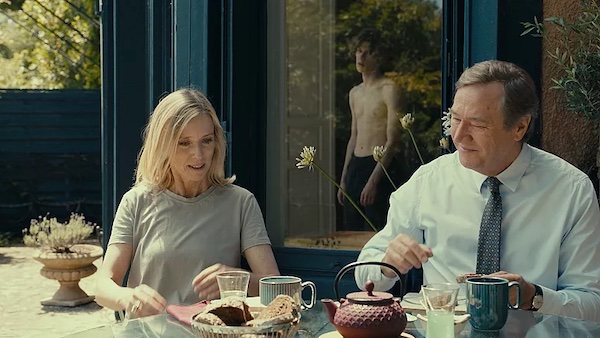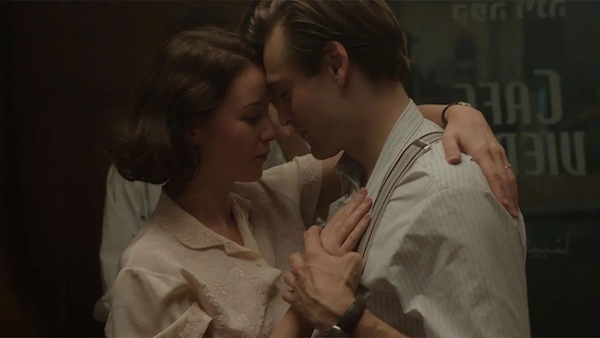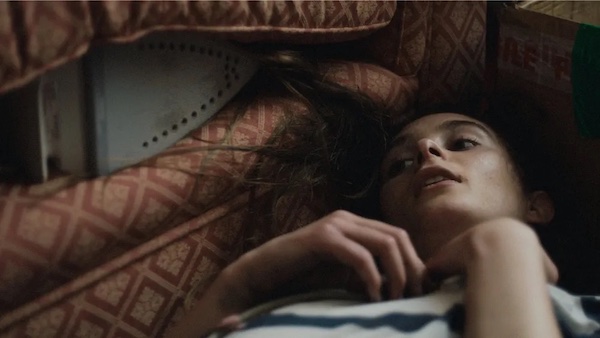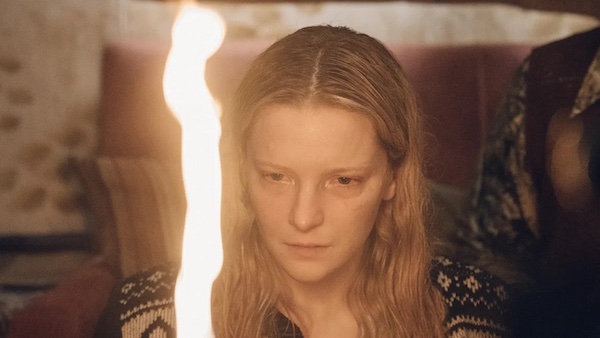London Film Festival, Dispatch #3: What Is Love
By Peg Aloi
Closing out coverage of the London Film Festival: films from Catherine Breillat, Michael Winterbottom, Luna Carmoon, Robert Morgan, and Daniel Kokotajlo.
First off, pleased to say Mika Gustafson’s excellent debut Paradise Is Burning won the Swedish filmmaker a prestigious Sutherland Award for First Feature. I was glad to have a chance to see a few foreign language films at this year’s festival, among them Catherine Breillat’s Last Summer and Michael Winterbottom’s Shoshana.

A scene from Catherine Breillat’s probe of the the shadow side of a high-powered life, Last Summer. Photo: LFF
Breillat is a filmmaker known for her controversial and occasionally shocking narratives involving tumultuous relationships and intense sexual dynamics. I found her feature Fat Girl (an odd translation of the original French title, A Ma Souer!/To My Sister!) so disturbing that I can’t watch it a second time. In the opening scene of Last Summer (L’Été dernier), Anne, a successful lawyer interviews a young woman who’s been sexually assaulted. Played by Léa Drucker (Custody), Anne is confident, caring, and enjoys an affectionate relationship with her slightly older husband Pierre (Olivier Rabourdin) and their adopted young daughters.
When Pierre’s 17-year-old son Theo (Samuel Kircher) comes to live with his estranged father for the summer, the boy’s slovenly ways and rudeness cause disruption in the household. Anne gains the upper hand by threatening to expose Theo’s dishonesty, and the boy makes an effort to befriend his young stepsisters and behave more respectfully. The chemistry between Theo and Anne is immediate; it’s not a surprise when they begin a passionate affair. Anne’s carefully arranged life suddenly tips into free fall after she takes uncalculated risks, and Theo’s sexual sophistication doesn’t balance his lack of emotional maturity. Last Summer is a remake of the recent Danish thriller Queen of Hearts, starring Trine Dyrholm (Margrete, Queen of the North). In Breillat’s hands, the story explores the shadow side of a high-powered life, and the performances are top notch, especially Samuel Kircher, who plays Theo with complexity and sensitivity.

A scene from Michael Winterbottom’s Shoshana. Photo: LFF
Shoshana embodies Michael Winterbottom’s uncanny ability to move from documentary to narrative forms with deft expertise. The film’s framing — including archival photographs and voice-over narration — makes it feel you are watching a historical documentary. But the experiences of Shoshana, a Jewish journalist living in the newly founded city of Tel Aviv in 1938, is at the heart of the story. Her English lover Thomas (Douglas Booth) is a high-level police detective, working under a rather cold-blooded supervisor (The Pale Blue Eye’s Harry Melling), tasked with investigating members of the Israeli resistance, some of whom have begun planting bombs in civilian areas. Thomas’s work becomes increasingly entangled in the escalation of global events leading to the rise of the Third Reich and the invasion of Poland. Shoshana, torn between maintaining neutrality as a reporter and wanting to support the burgeoning resistance movement, chooses her professional and national loyalties over her personal life — much to Thomas’s chagrin. The film unfolds with gentle suspense against a sumptuous backdrop (filmed along the coast of Italy, a convincing stand-in for the Tel Aviv of nearly a century ago) that presents a poignant view of an elegant city on the brink of change and upheaval.

A scene from Hoard. Photo: LFF
In Luna Carmoon’s Hoard, a young mother and her daughter live in a London flat bursting to the seams with found objects and trash. Hayley Squires (In the Earth) plays Cynthia, whose hoarding tendencies are pitted against her dynamic, obsessive personality. Preteen Maria is fiercely protective of her mother, but struggles with the hurtful teasing of her peers and daily humiliations at school because of her dysfunctional household. Eventually forced into foster care, Maria (later played by Saura Lightfoot Leon) flourishes in a supportive home, making friends and excelling in school. When Michael (Stranger Things’ Joseph Quinn), a former resident of her foster home, arrives to stay a few days before he moves into a new flat, Maria finds a weird soulmate. At this point, Maria makes a psychological shift: she seems to revert back to the emotional stress of her previous hoarding situation. An impressive debut feature, this sensitively rendered film is often moving but also occasionally hard to watch because of its detailed look at the enduring psychological impacts of trauma and troubled childhood.
One of my colleagues will be reviewing The Killer, so I won’t say much about David Fincher’s new thriller about a skilled assassin (Michael Fassbender). It was glossy and suspenseful, and the sound design (full of stop-start snippets of songs by The Smiths played in the protagonist’s headphones) was intriguing. Still, overall, this violent, sleekly constructed film felt cold and soulless to me. I look forward to what I am sure will be an astute review in our pages!
Stopmotion is an unusual, atmospheric story that centers on Ella (Aisling Franciosi), a young woman who works as the production assistant to her mother, Suzanne (Stella Gonet), an award-winning stopmotion animator whose demanding sensibility makes her a bit of a tyrant. Her mother’s failing health prevents her from completing her final film so Ella offers to help, to bring her own ideas to the table. Ella wants to be able to draw on animation to tell her story, but she comes up short, struggling to master wax and fabric. One day, a little girl (Caoillin Springall) shows up in her building and starts following Ella around. Her presence inspires Ella, who begins work on a story suggested by the young visitor. It is a dark fairy tale about a little girl trapped in a house in the woods: she is waiting for a dangerous intruder. As the animator works and interacts daily with the little girl, Ella gradually retreats from her daily life. Her boyfriend Tom (Tom York), employed by an animation company run by his sister, realizes she’s coming unraveled but can’t help. The visuals are astounding in Stopmotion; it is filled with unsettling claymation figures and a darkly suspenseful atmosphere. Co-writer and director Robert Morgan has crafted an impressive first feature that is certainly visually arresting. But the film lacks dramatic power because it does not provide sufficient motivation for Ella’s descent into temporary madness.

A scene from Starve Acre. Photo: Chris Harris
Adapted from Andrew Michael Hurley’s critically acclaimed novel, Starve Acre is an unsettling folk horror tale set in ’70s rural England. Matt Smith (The Crown) and Morfydd Clark (Saint Maud) are Richard and Juliette, a young couple living in a remote country house where Richard works as an archeologist examining local relics. Setting up tents and digging in cold wet weather occupies Richard’s time after a tragic loss, while Juliette retreats to her bed. Soon after Juliette’s sister comes for a visit, Richard discovers a set of animal bones and puts them aside. When the bones exhibit strange, impossible changes, he becomes obsessed. There’s a vibe reminiscent of the Icelandic film Lamb here: both films posit worlds of humans and animals coinciding with intimate strangeness. Directed by Daniel Kokotajlo, who co-wrote the screenplay with Hurley, Starve Acre is a satisfying addition to the growing crop of English folk horror narratives that venture past the edges of magic realism, entering into a wild realm that lies just beyond our waking vision.
Peg Aloi is a former film critic for the Boston Phoenix and member of the Boston Society of Film Critics, the Critics Choice Awards, and the Alliance for Women Film Journalists. She taught film studies in Boston for over a decade. She writes on film, TV, and culture for web publications like Time, Vice, Polygon, Bustle, Mic, Orlando Weekly, and Bloody Disgusting. Her blog “The Witching Hour” can be found on substack.
Tagged: Catherine Breillat, Hoard, Last Summer, London Film Festival 2023, Luna Carmoon, Michael Winterbottom, Richard Harris, Shoshana, Starve Acre
